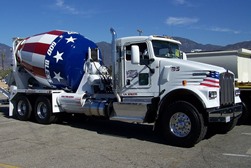How to Enroll in the Best CDL Driving Classes near Ontario California
 Congrats on your decision to become a trucker and enroll in a trucking school near Ontario CA. Perhaps it has always been your dream to hit the open highway while operating a big ole tractor trailer. Or perhaps you have done some analysis and have found that a career as a truck driver provides good income and flexible job prospects. No matter what your reason is, it's essential to obtain the appropriate training by choosing the right CDL school in your area. When reviewing your options, there are various variables that you'll want to think about prior to making your final choice. Location will certainly be important, especially if you need to commute from your Ontario residence. The expense will also be of importance, but selecting a school based solely on price is not the optimal way to make sure you'll get the right education. Just remember, your goal is to master the skills and knowledge that will allow you to pass the CDL exams and become a qualified truck driver. So keeping that goal in mind, just how do you pick a truck driving school? That is what we are going to address in the remainder of this article. But first, we are going to discuss a little bit about which commercial driver's license you will eventually need.
Congrats on your decision to become a trucker and enroll in a trucking school near Ontario CA. Perhaps it has always been your dream to hit the open highway while operating a big ole tractor trailer. Or perhaps you have done some analysis and have found that a career as a truck driver provides good income and flexible job prospects. No matter what your reason is, it's essential to obtain the appropriate training by choosing the right CDL school in your area. When reviewing your options, there are various variables that you'll want to think about prior to making your final choice. Location will certainly be important, especially if you need to commute from your Ontario residence. The expense will also be of importance, but selecting a school based solely on price is not the optimal way to make sure you'll get the right education. Just remember, your goal is to master the skills and knowledge that will allow you to pass the CDL exams and become a qualified truck driver. So keeping that goal in mind, just how do you pick a truck driving school? That is what we are going to address in the remainder of this article. But first, we are going to discuss a little bit about which commercial driver's license you will eventually need.
Which CDL Should You Get?

In order to drive commercial vehicles lawfully within the United States and Ontario CA, a driver needs to obtain a CDL (Commercial Driver's License). The 3 license classes that one can qualify for are Class A, Class B and Class C. Since the topic of this article is how to choose a truck driver school, we will focus on Class A and Class B licenses. What differentiates each class of CDL is the type of vehicle that the driver can operate in addition to the GVWR (Gross Vehicle Weight Rating) or GCWR (Gross Combination Weight Rating). Below are brief summaries of the two classes.
Class A CDL. A Class A CDL is required to operate any vehicle that has a GCWR of more than 26,000 lbs., including a towed vehicle of more than 10,000 lbs. Some of the vehicles that operators may be able to drive with Class A licenses are:
- Interstate or Intrastate Tractor Trailers
- Trucks with Double or Triple Trailers
- Tanker Trucks
- Livestock Carriers
- Class B and Class C Vehicles
Class B CDL. A Class B CDL is required to drive single vehicles having a GVWR of more than 26,000 lbs., or a GCWR of greater than 26,000 lbs. including a towed vehicle weighing up to 10,000 lbs. A few of the vehicles that drivers may be qualified to operate with Class B licenses are:
- Tractor Trailers
- Dump Trucks
- Cement Mixers
- Large Buses
- Class C Vehicles
Both Class A and Class B CDLs may also need endorsements to operate certain types of vehicles, for instance passenger or school buses. And a Class A license holder, with the appropriate required endorsements, can operate any vehicle that a Class B license holder is qualified to operate.
How to Evaluate a Truck Driving School

After you have determined which Commercial Drivers License you would like to obtain, you can begin the process of evaluating the Ontario CA trucking schools that you are considering. As earlier discussed, cost and location will no doubt be your initial concerns. But it can't be stressed enough that they should not be your sole concerns. Other variables, for instance the experience of the instructors or the reputations of the schools are similarly if not more important. So following are several additional points that you should research while performing your due diligence prior to selecting, and particularly paying for, your truck driving training.
Are the Schools Certified or Accredited ? Very few trucking schools in the Ontario CA area are accredited due to the stringent process and cost to the schools. However, certification is more common and is offered by the Professional Truck Driver Institute (PTDI). A school is not required to become certified, but there are several advantages. Interested students recognize that the training will be of the highest quality, and that they will get plenty of driving time. For example, PTDI calls for 44 hours of actual driving time, not simulations or ride-alongs. So if a school's course is certified (the course, not the school is certified), students know that the curriculum and training will meet the very high benchmarks set by PTDI.
How Long in Operation? One indicator to help assess the quality of a trucking school is how long it has been in business. A negatively rated or a fly by night school typically will not stay in business very long, so longevity is a plus. However, even the best of Ontario CA schools had to start from their first day of training, so consider it as one of several qualifiers. You can also find out what the school's history is concerning successful licensing and job placement of its graduates. If a school won't provide those numbers, search elsewhere. The schools should also maintain relationships with local and national trucking firms. Having numerous contacts not only points to a superior reputation within the trade, but also bolsters their job placement program for graduates. It also wouldn't hurt to get in touch with the California licensing authority to confirm that the CDL trucking schools you are considering are in compliance.
How Effective is the Training? At a minimum, the schools must be licensed in California and employ instructors that are experienced and trained. We will discuss more about the instructors in the next section. Also, the student to instructor proportion should not be higher than 4 to 1. If it's any greater, then students will not be obtaining the individual instruction they will need. This is especially true regarding the one-on-one instruction for behind the wheel training. And watch out for any school that claims it can teach you to be a truck driver in a comparatively short time period. Learning to be a truck driver and to drive a tractor trailer professionally takes time. The majority of Ontario CA schools offer training programs that run from 3 weeks to as long as 2 months, based on the class of license or kind of vehicle.
How Good are the Teachers? As earlier stated, it's imperative that the instructors are qualified to teach driving methods and experienced as both instructors and drivers. Although a number of states have minimum driving time criteria to qualify as an instructor, the more professional driving experience a teacher has the better. It's also important that the instructors keep current with industry advancements or any new regulations or changes in existing laws. Evaluating teachers may be a little more intuitive than other criteria, and possibly the ideal method is to visit the school and talk to the teachers in person. You can also talk to some of the students going through the training and find out if they are happy with the quality of instruction and the teacher's ability to train them.
Plenty of Driving Time? Most importantly, a great trucking school will furnish ample driving time to its students. After all, isn't that what it's all about? Driving time is the actual time spent behind the wheel driving a truck. While the use of ride-a-longs with other students and simulators are necessary training methods, they are no substitute for actual driving. The more instruction that a student receives behind the wheel, the better driver she or he will become. Although driving time varies among schools, a reasonable standard is 32 hours at a minimum. If the school is PTDI certified, it will furnish a minimum of 44 hours of driving time. Check with the Ontario CA schools you are researching and find out how much driving time they provide.
Are they Independent or Captive ? It's possible to receive discounted or even free training from certain trucking schools if you enter into an agreement to be a driver for a specified carrier for a defined amount of time. This is called contract training, and the schools that provide it are called captives. So rather than having affiliations with many different trucking lines that they can refer their students to, captives only refer to one company. The tradeoff is receiving free or less expensive training by giving up the freedom to initially work wherever you have an opportunity. Naturally contract training has the potential to reduce your income prospects when beginning your new career. But for some it may be the best way to receive affordable training. Just make sure to ask if the Ontario CA schools you are considering are independent or captive so that you can make an informed decision.
Provide CDL Testing Onsite? There are several states that will allow third party CDL testing onsite of truck driving schools for its students. If onsite testing is allowed in California, ask if the schools you are considering are DMV certified to provide it. One benefit is that it is more accommodating than battling with graduates from competing schools for test times at California testing locations. It is moreover an indicator that the DMV considers the authorized schools to be of a higher quality.
Are the Classes Convenient? As earlier noted, truck driving training is just one to two months long. With such a short term, it's important that the Ontario CA school you enroll in offers flexibility for both the scheduling of classes and the curriculum. For example, if you're having difficulty learning a certain driving maneuver, then the teacher should be prepared to commit more time with you until you are proficient. And if you're still working while attending training, then the class scheduling must be flexible enough to accommodate working hours or other commitments.
Is Job Assistance Provided? The moment you have acquired your commercial driver's license after graduating from trucking school, you will be anxious to start your new career. Make sure that the schools you are looking at have job placement programs. Find out what their job placement ratio is and what average salary their grads start at. Also, ask which national and local trucking companies their graduates are placed with for employment. If a school has a poor job placement rate or few Ontario CA employers hiring their grads, it might be a sign to search elsewhere.
Is Financial Aid Available? Truck driver schools are comparable to colleges and other Ontario CA area trade or technical schools when it comes to loans and other forms of financial assistance being available. Ask if the schools you are assessing have a financial assistance department, or at least someone who can help you navigate the options and forms that need to be completed.
Learn More About Ontario CDL Driver Schools
Select the Best Ontario CA Truck Driving Training
Picking the right truck driver school is an essential first step to beginning your new vocation as a long distance or local truck driver. The skill sets that you will learn at school will be those that forge a new career behind the wheel. There are many options offered and understanding them is critical to a new driver's success. However, you must get the proper training in order to operate a big commercial vehicle in a safe and professional fashion. If you are short on cash or financing, you might need to look into a captive school. You will pay a reduced or even no tuition by agreeing to drive for their contracted carrier. Or you can enroll in an independent trucker school and have the the freedom to drive for the trucking company of your choice, or one of several affiliated with the school. It's your decision. But regardless of how you get your training, you will soon be joining a profession that helps America move as a professional trucker in Ontario CA.
